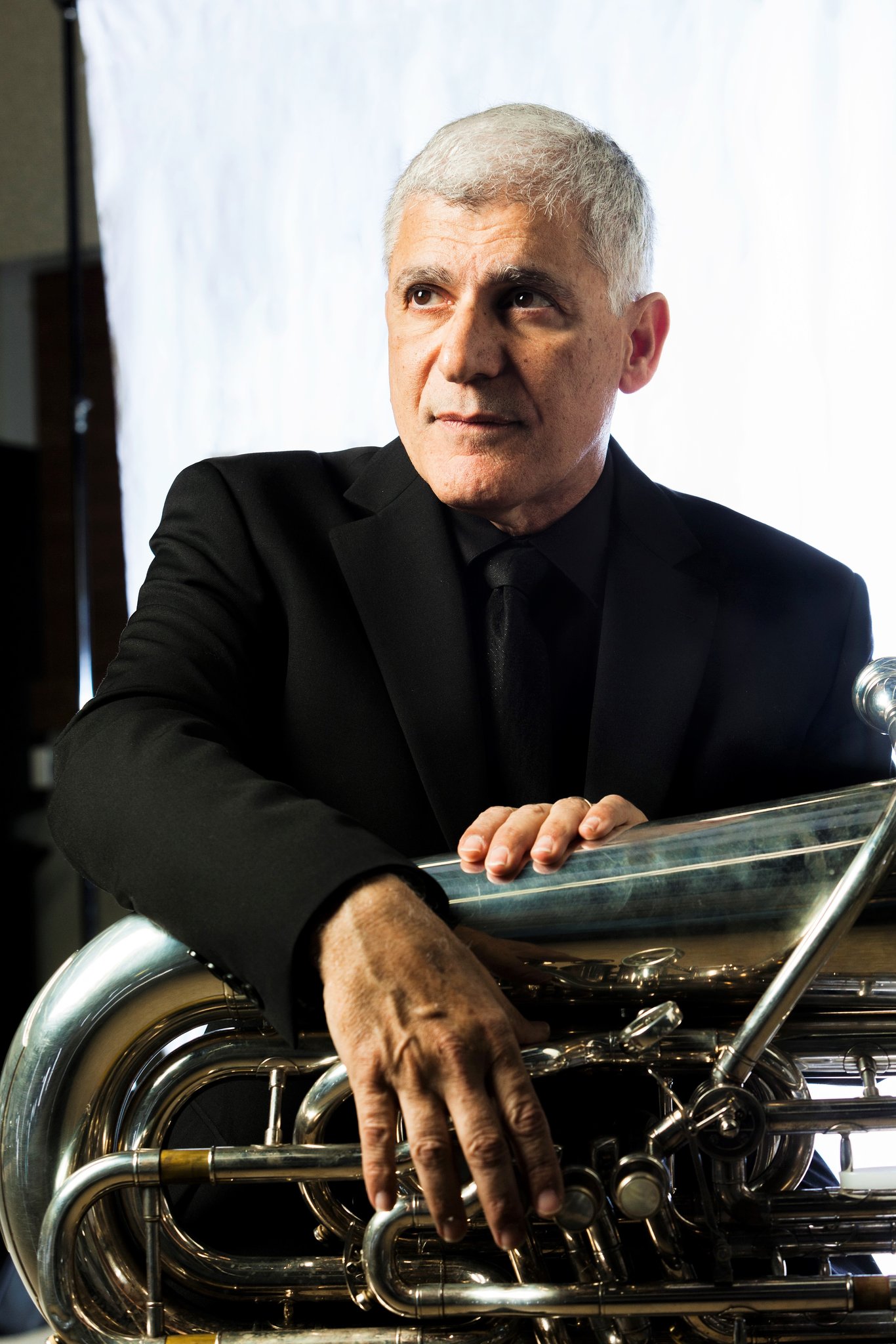
ASU remembers
Sam Pilafian |
Teacher and Musician

April 5, 2019
Sam Pilafian, 69, passed away on April 5, 2019. He was a virtuoso tuba player who performed an eclectic mix of classical, jazz, pop and rock music and brought unflagging exuberance to teaching young tubists. As a busy soloist, a founding member of the influential Empire Brass quintet and a partner to the acoustic guitarist Frank Vignola in the jazz group Travelin' Light, Mr. Pilafian expanded the musical possibilities of his lumbering instrument. A natural entertainer, he was once nicknamed the Evel Knievel of the Tuba for daringly playing "The Clarinet Polka" while standing on his head. He also tried teaching the tuba to Fred Rogers on an episode of "Mister Rogers' Neighborhood" in 1985. "You have to blow through buzzing lips," Mr. Pilafian told Mr. Rogers. After creating a sound, Mr. Rogers said, "Your lips tickle.” Mr. Pilafian tickled his lips during more than 40 years of diverse collaborations. He played with the singers Bernadette Peters and Barbara Cook; the Duke Ellington and Lionel Hampton orchestras; the ensemble on the Philip Glass album "Koyaanisqatsi" (1982); the New York Philharmonic and the Boston Symphony Orchestra, as a substitute or soloist; and Pink Floyd, on the 1979 album "The Wall.” Mr. Pilafian is best known for his work with Empire Brass, whose repertoire includes Renaissance and Baroque music, transcriptions of classical works, show tunes, Christmas songs and pieces composed for the quintet. It has released more than two dozen recordings. Empire Brass embraces the classic brass quintet configuration - a pair of trumpets, French horn, trombone and tuba - and has long been known for its virtuosity and showmanship. “You have not often heard an ensemble that played with more gusto than this one," the New York Times music critic Donal Henahan wrote of an Empire recital in 1977. Sam played the accordion as a youngster, but he switched instruments at age 11 on the advice of a veteran tubist, who told him that if he played tuba he would always have friends. He was a quick study and within a few years had joined the musicians union and was playing in hotel orchestras that backed headliners like Frank Sinatra and Liza Minnelli, and in a six-piece Dixieland band that performed at racetracks and other places around Miami. While attending what is now the Frost School of Music at the University of Miami, where he earned a bachelor's degree, he had a summer fellowship at the Tanglewood Music Center for advanced music training in Lenox, Mass. His tuba playing impressed Leonard Bernstein, who was an adviser there, and who enlisted him in the orchestra for the premiere of his theatrical work "Mass" at the opening of the Kennedy Center in Washington in 1971. Tanglewood was also the birthplace of Empire Brass. Michael Tilson Thomas, the music director of the San Francisco Symphony, was then a conducting student at Tanglewood. He told Bernstein that the five brass instrumentalists "should begin playing together because we sound alike, although we had never met,” Mr. Pilafian told The Post-Dispatch. “So we did," he added, "and we became a rehearsal band, getting together just to rehearse.” He remained with the group for 22 years, leaving in 1993. Mr. Pilafian was also a teacher for many years. He held positions at Boston University, Berklee College of Music, the Tanglewood Institute, ASU and the Frost School. He and a fellow tubist, Patrick Sheridan, developed a series of exercises adapted from martial arts and yoga to help singers and wind and brass players breathe more effectively. When Mr. Pilafian was in college, he was determined to do whatever was necessary to elevate his musicianship. So he tried an experiment with a friend, Mike Gerber, a blind pianist, he told NDSU Magazine in 2017, when he was a visiting artist at North Dakota State University. Fascinated by Mr. Gerber's heightened sense of hearing, Mr. Pilafian bandaged his own eyes. He was disoriented that first day but felt that his hearing had noticeably improved after three days. On Day 4, he concluded that his listening had grown dramatically acute, and he could play back whatever Mr. Gerber played on the piano. "Nothing was the same after that," he said. In addition to his wife, Diann (Jezurski), Mr. Pilafian is survived by two sons and two sisters. (Source: ASU Foundation)